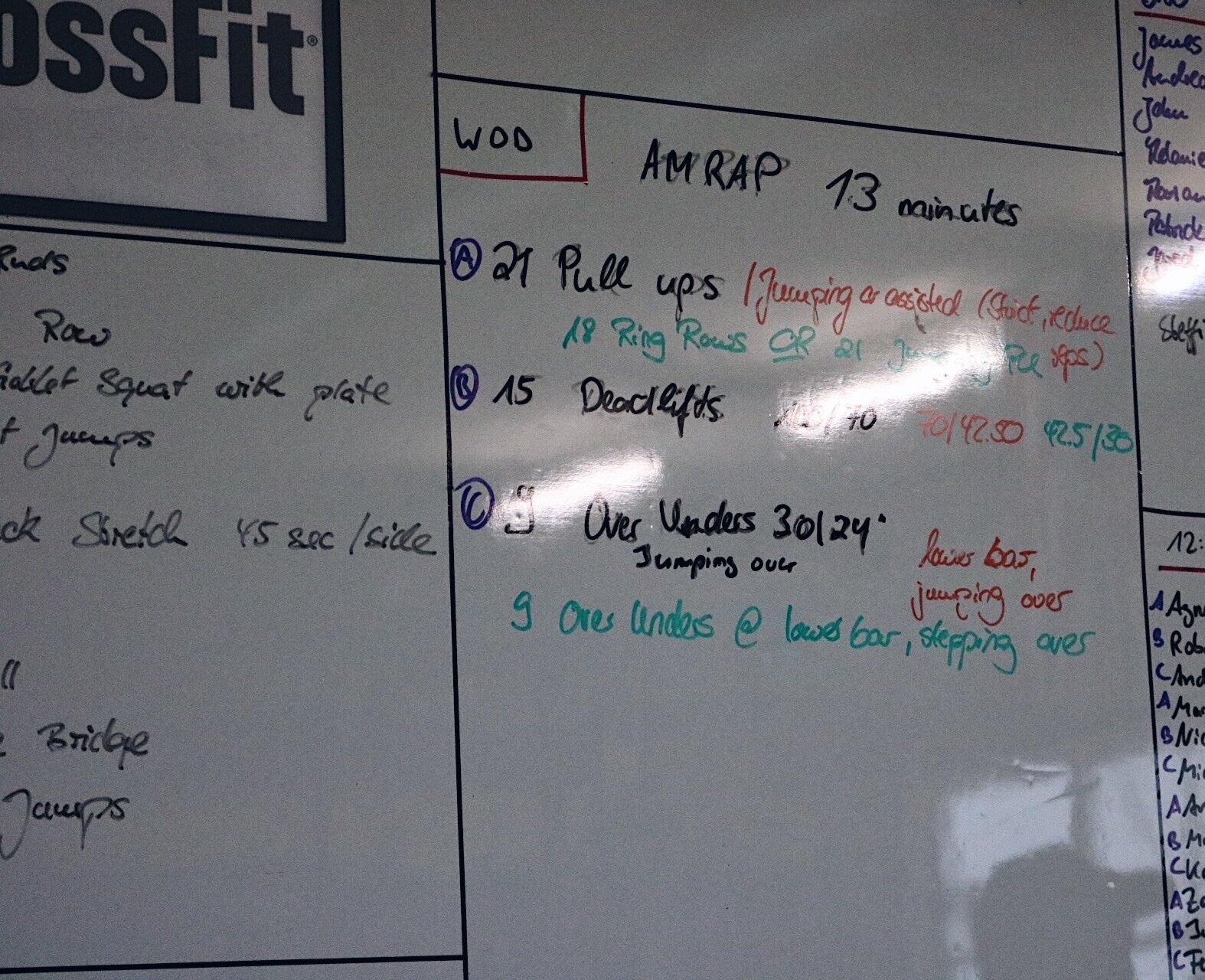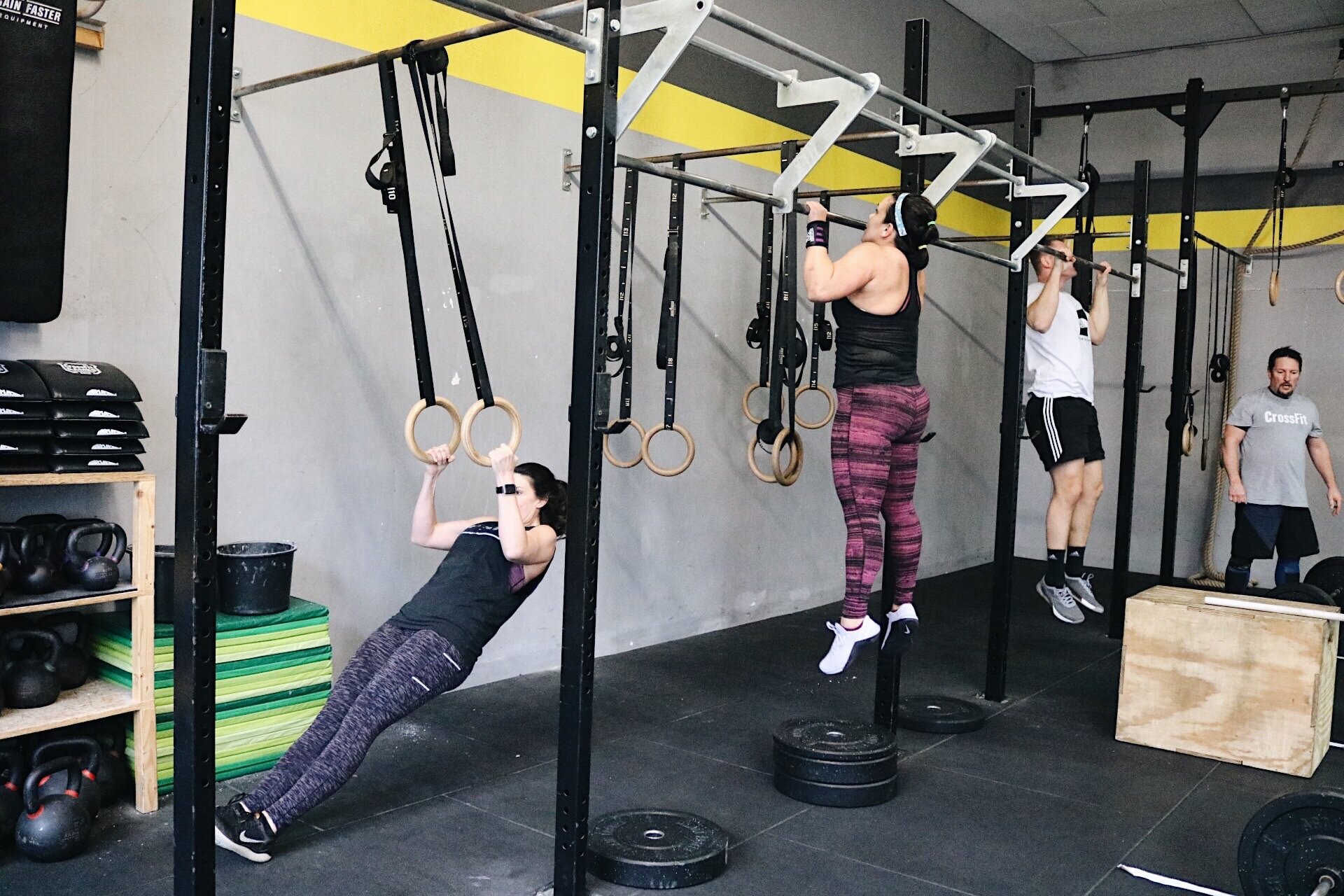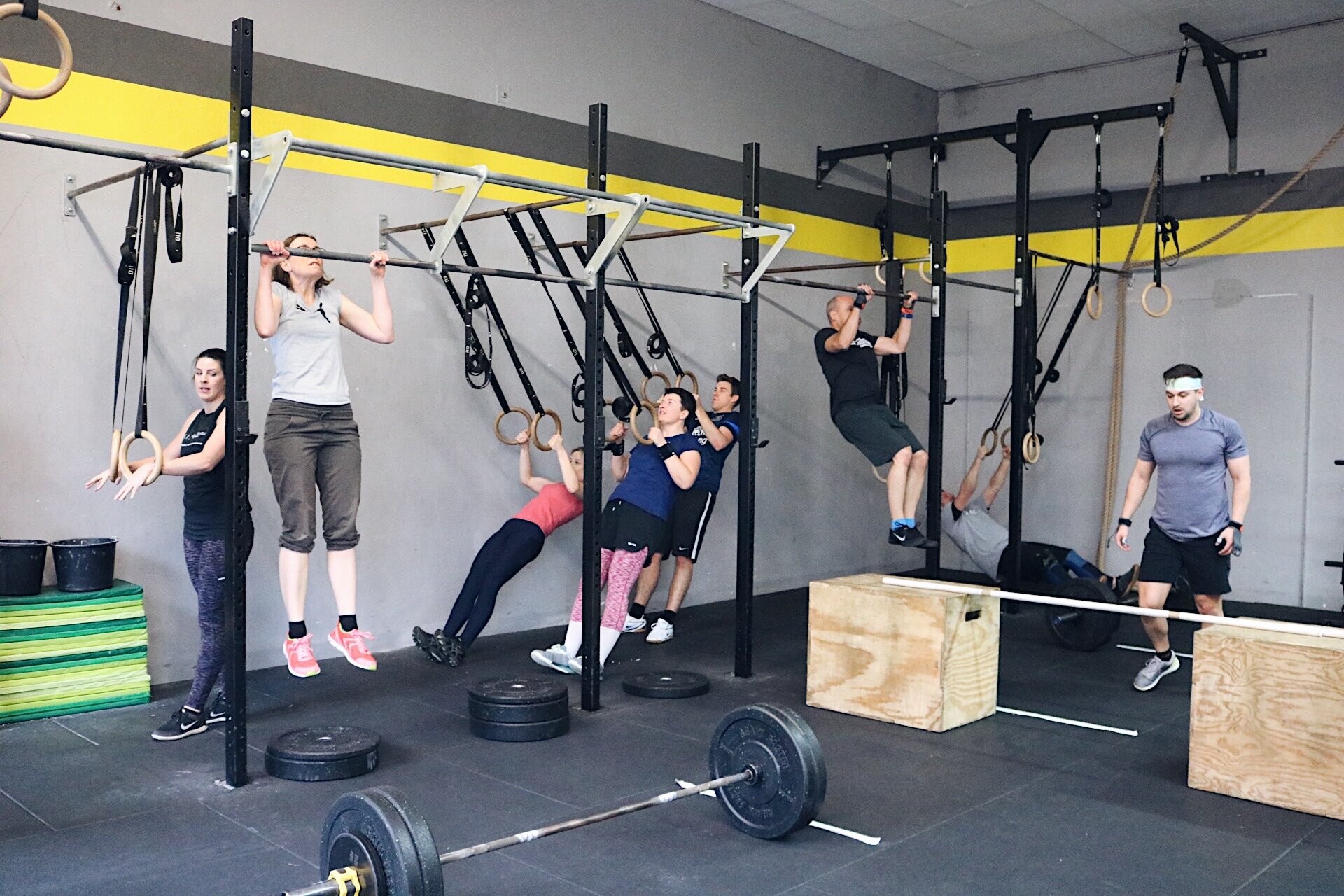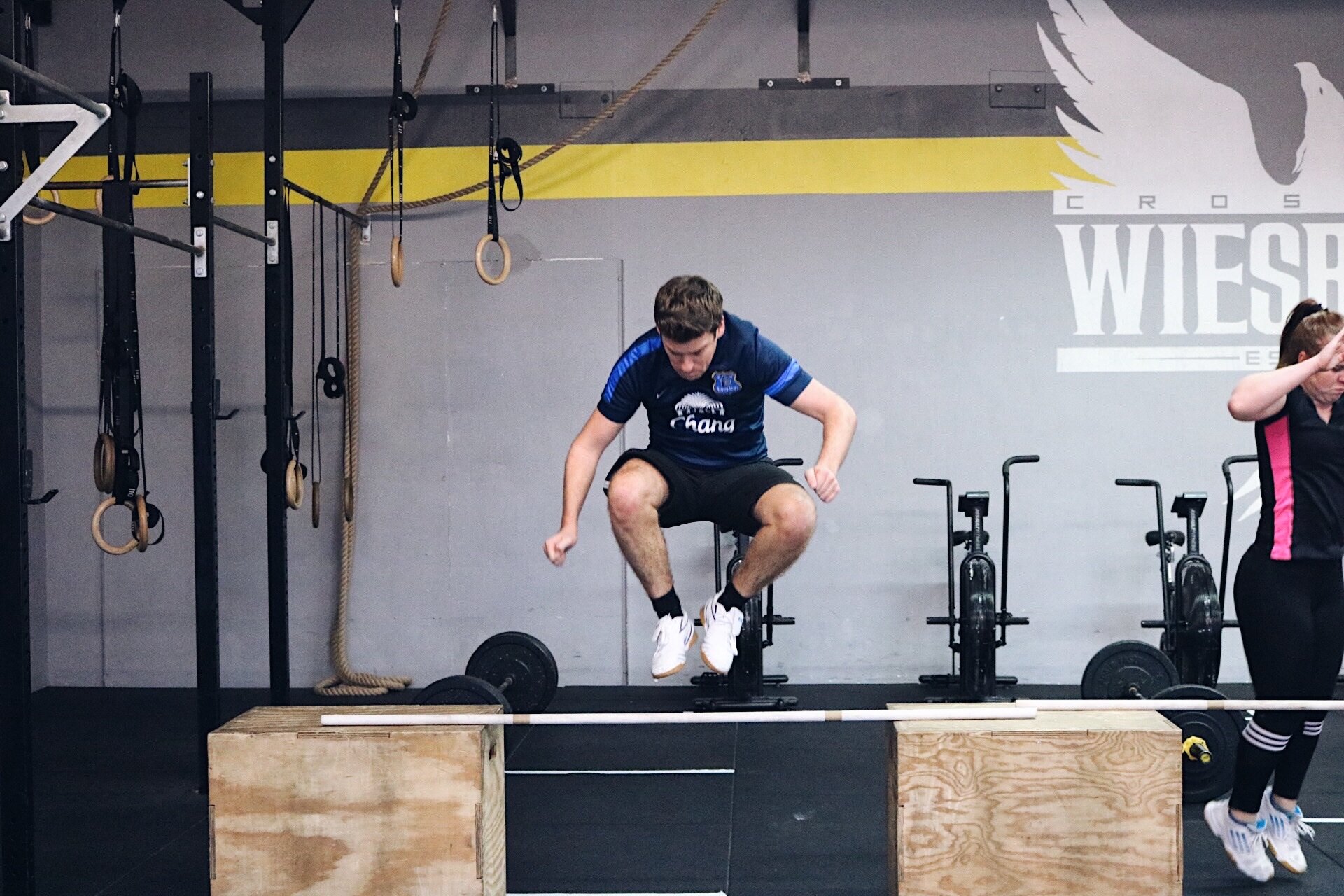Scaling is not a crime
Eine Sache, die ich beim CrossFit nie verstehen werde ist es, wenn man nach dem Workout jemanden beglückwünscht zu seinem Score oder seiner Zeit und als Antwort kommt: “Ja, aber ich habe das Workout nur skaliert gemacht”.
Halt Stop! Skalieren bedeutet nicht, dass du weniger hart gearbeitet hast, es bedeutet lediglich, dass du das Workout entsprechend deiner sportlichen Fähigkeiten angepasst hast. Die Zehen bei den Toes to bar nicht an die Stange zu bekommen, bedeutet nicht, dass du automatisch weniger machst. Hast du dich nicht trotzdem genauso kaputt angefühlt nach den 21-15-9 Squat Cleans und T2B letzten Montag?
Das schöne an CrossFit ist doch gerade, dass die Übungen (nein, das Assault Bike wird nicht skaliert!) angepasst werden können und sie somit jeder machen kann, unabhängig vom sportlichen Level, Verletzungen und sonstigen Einschränkungen. CrossFit bedeutet zwar High Intensity, aber wir sehen das eher als relative Intensität. Diese sollte relativ zu deinen Fähigkeiten stehen. In unserem Einsteigerkurs bringen wir den Teilnehmern bei, dass Intensität gar keine Rolle spielt, so lange die Bewegungsausführungen nicht beherrscht werden. Genauso wenig bringt es dir ein Workout im Schneckentempo mit hohem Gewicht und “hauptsache Rx” durchzuführen, wenn man es, etwas angepasst, auch wesentlich schneller schaffen kann. Damit meine ich jetzt nicht, das Gewicht zu halbieren, sondern lediglich das richtige Gewicht zunehmen, damit der Trainingsstimulus erreicht wird. Das Trainingsziel erzählen wir Coaches immer vor dem Workout, an manchen Tagen muss es eben auch mal schwer und etwas langsamer sein :) Wenn ihr skaliert, sollte aber (falls möglich) niemals am vollen Bewegungsumfang gespart werden. Die Beanspruchungs des kompletten Muskels bei leichterem Gewicht bringt immer noch mehr als der halbe Bewegungsumfang bei mehr Gewicht.
Also passt das Gewicht angemessen an und fragt zur Not immer den Coach, wie ihr skalieren solltet.
Und denkt daran, wenn ihr mal zu viel skaliert habt: arbeitet einfach schneller und schneller bedeutet auch eine höhere Intensität und somit werdet ihr ebenfalls fitter und das ist doch eines deiner Ziele, oder? Solange du mehrmals die Woche ins Training kommst, verbessert du dein Fitness-Level und irgendwann wird das Band verschwinden und die Gewichte werden nach und nach schwerer. Dafür musst du aber ehrlich zu dir selbst sein und weiterhin hart arbeiten. Somit kommt man jeden Tage näher und näher an das nächste Level. Über das jeweilige Fitness-Level habe ich übrigens im letzten Blog-Post geschrieben, den ihr hier nochmal nachlesen könnt.
Wer mehr zum Thema Scaling durchlesen möchte, kann dies gerne im CrossFit Journal unter folgendem Link tun.
Scaling is not a crime!
Scaling is not a crime
One thing that I will never understand about CrossFit is when you compliment someone after their workout on their score or time and they come up with the answer: "Yeah well, but I scaled the workout".
Stop that! Scaling doesn't mean you haven't worked as hard, it just means that you've adjusted the workout based on your athletic ability. Not getting your toes on the bar doesn't mean that you’re automatically doing less than someone else. Didn’t you feel pretty beat up after the 21-15-9 Squat Cleans and T2B workout last Monday?
The good thing about CrossFit is that almost every exercise (nope, you can’t scale the Assault Bike) can be adjusted and everyone can do them, regardless of their fitness level, injuries or other restrictions. CrossFit means high intensity, but we see it as relative intensity. It should be relative to your own skills. In our beginners' course, we teach that intensity doesn't matter at all as long as the mechanics of the movements are not mastered. It doesn’t make sense to move at a snail's pace with a heavier weight and “doing it Rx” if you can crush a workout with some adjustments. I don't mean to stripp off all the weights, I mean you should just use the right weight so that the training stimulus is achieved. As coaches we always tell you the goal and trainings stimulus before the workout. On some days that could be also a challenging weight and moving a bit slower :) If you scale, you should (if possible) never neglect the full range of motion. Working the entire muscle range of motion with lighter weight is what builds strength to graduating to higher levels rather than cheating range of motion with more weight.
So adjust the weight appropriately and, if necessary, always ask the coach how you should scale the workout.
And remember, if you have scaled too much: simply work faster and faster also means a higher intensity and thus you will also get fitter. And that is one of your goals, isn't it? As long as you train several times a week, you will improve your fitness level and eventually the band will disappear and the weights will gradually become heavier and heavier. But you have to be honest with yourself and continue to work hard. I’ll promise you’ll get closer and closer to the next fitness level every day. By the way, I wrote about the respective fitness levels in the last blog post, which you can read here again.
If you like to read more about scaling, here is a link to an article, posted in the CrossFit Journal.




